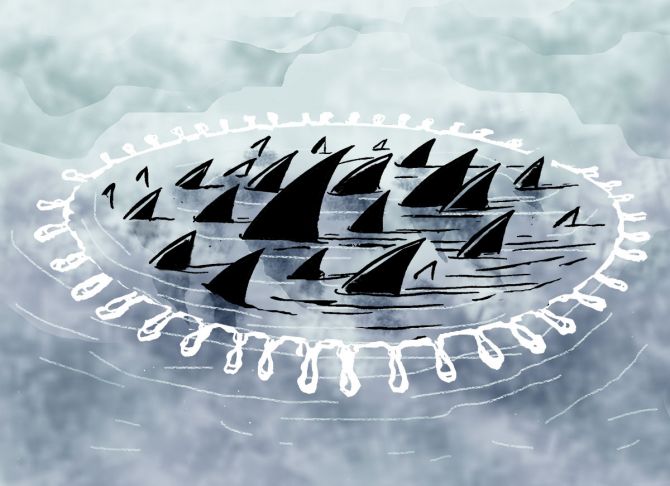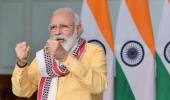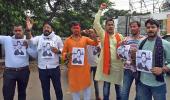'The norm will be even less public accountability, even less transparency, tweets instead of press conferences, TV lectures rather than parliamentary debate, and greater political authoritarianism,' predicts Sunanda K Datta-Ray.

Only someone born to riches like Jawaharlal Nehru would dream of a 'socialistic pattern of society' for India.
Lesser mortals do not need the blistering COVID-19 experience to know that this has always been a catch-as-catch-can profit-driven society.
The pandemic could tear aside pieties and posturing and unveil a more authentic India by sparking the kind of economic surge that shaped the Roaring Twenties after the Spanish flu epidemic.
Of course, India does boast a certain underlying holiness that explains why, as the much-maligned Kipling put it with only slight hyperbole, 'So long as there is a morsel to divide, neither priest nor beggar starves.'
Token of that goodness, my wife and I have received many kindnesses, including cooked meals, from neighbours since Narendra Modi's fateful March 25 announcement.
But with different faces in different places, there are no set patterns of behaviour.
Exceptions don't demolish the norm whose instinctive neoliberalism would have won applause from both Margaret Thatcher and Ronald Reagan.
An economist friend used to say in the heyday of the Licence Raj that India was more than capitalist.
Whereas everything had a price in normal capitalist systems, in India not merely everything but everybody had a price.
People, contracts, jobs, everything was up for sale.
A vibrant free market elevated politics to the lofty heights of trade.
As the political crises at the height of the pandemic in Madhya Pradesh and Rajasthan confirmed, it transformed politicians into products.
One look at the worldly assets and thriving business enterprises of our 'godmen' (supposedly the highest form of life that desi soil can evolve unless you dismiss the lot as crooks and cranks?) suffices to explain that Caesar and God are one and the same when it comes to rendering individual dues.
Separation of powers is admirable for temporal governance, but when it comes to spiritual jurisdiction, it's always 'heads I win, tails you lose'.
Ingenuity, resourcefulness and, of course, the profit motive have injected new vigour into the old belief that it's an ill wind that blows nobody any good.
India mourned 3.5 million coronavirus infections and 63,498 fatalities up to August 29, but, as during the 1942-1943 Bengal famine, no one keeps track of fortunes amassed from disease and death.
It is much more comfortable to blame a distant, long-dead and unabashedly imperialist Briton.
Local traders and black marketeers who hoarded grain to sell at an exorbitant price were probably loudest in their accusations.
Online gaming is spiralling. So are gambling and speculation. Physical inactivity sends minds into overdrive.
Similar opportunism also marks this period of lockdowns, shortages and privations.
Transport operators and even state governments were quick to extract exorbitant fares when hordes of migrant workers first darkened the horizon.
With trains still stalled, private cars demand thousands of rupees to ferry passengers to neighbouring states whose chief ministers don't welcome potentially virus-carrying outsiders.
If any policeman spots these illegal taxis, money is as effective in salving conscience as in compensating for the absence of PPE kits in some hospitals.
In recent months, courier charges have been nearly doubled and the next-day delivery guarantee withdrawn.
That is, we pay more for less.
Soaring prices suggest mangoes refuse to be plucked; the Ganga's hilsa maintains a safe distance from fishermen; sheep and goats have put their foot down against slaughter; and beef is exported for mlechas abroad to preserve domestic purity.
Hospitals are insisting on hefty deposits and MRP on packaging means nothing.
That's the new world looming ahead.
A controversial coastal road reportedly being built on the quiet isn't the only change.
An already virtually moribund India Post will do even less.
Home delivery, takeaways, extensive digitalisation (leaving dinosaurs like this writer floundering), more online teaching and further deterioration of education will increase the scope for go-betweens, dalals in the vernacular.
The norm will be even less public accountability, even less transparency, tweets instead of press conferences, TV lectures rather than parliamentary debate, and greater political authoritarianism.
However, profiteering will ensure that fewer jobs, lower salaries, industrial stagnation, falling exports and agricultural disruption do not mean less disposable cash.
On the contrary, post-pandemic India might swarm with variants of the British spivs who waxed rich on shortages during and after World War II.
With modesty, simplicity and good taste going with the wind, it's a wonder that the proposed Ayodhya temple is content with silver bricks.
One way of saving Ram from Nepal's K P Oli might be to make his temporal habitat the grandest with nothing short of gold bricks.
That would befit the emerging India of Rs 10 lakh monogrammed jackets auctioned for Rs 4.31 crore and Boeings for the President and prime minister at a reported cost of Rs 8,458 crore.
Feature Presentation: Aslam Hunani/Rediff.com












 © 2025
© 2025